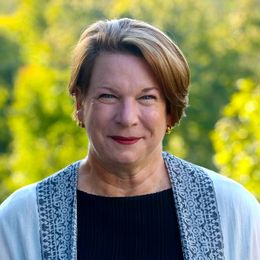Friendship Is a Universal Language
French and Spanish may have initially brought us together, but growing affection binds us deeper each week
I live in a suburban New York town without the usual ways of making friends: growing up here, attending schools here, having children or hobbies. Impeded by an arthritic hip that currently prevents me from walking and hiking, I've found it really challenging to find kindred spirits who share my interests and who actually make time for new friends.

Many women my age are already deeply committed to their own groups and pursuits: book clubs, canasta, mah jongg or grandchildren. I've never been much of a joiner, so it was a great relief to discover friendly, free, weekly meetings at a local library and a potential way to make new friends.
In French and Spanish.
As someone who speaks both, who grew up in Canada, and who has lived in France, Quebec and Mexico, I've finally found my people!
Every Wednesday at 1:00 six to 10 of us settle in around a long table, greeting one another with a cheery "Bonjour!"
Every Wednesday at 1:00 six to 10 of us settle in around a long table, greeting one another with a cheery "Bonjour!" For the next hour we enjoy lively, free-flowing conversation, all in French. The topics range widely, from our dogs (photos, too, of course!) to architecture, film and music. It is an amazing group.
There's Sarah, born in Palestine, 87, raised in the Congo, educated in South Africa, a retired art historian. Tall and elegant, she rode an elephant on her 75th birthday. Anne, in her mid-60s, who plays the lute and speaks Russian and German, has spent her career working with Leonard Bernstein's music and shared her insider's thoughts on "Maestro," the new film about his life, work and marriage.
Maria is a former ballerina from California now working in health care. Helen, a widow who studied at the Sorbonne in her 20s, arrives every week wearing the intricate sweaters she hand-knits. Felicia, who left her native Chile to attend school in Switzerland, carved out a successful corporate career here – no small feat for a woman now 80.
At 36, Olga is the youngest, from Ukraine, a teacher of English as a second language. Naomi is Israeli, and at our meeting on October 11, 2023 gave us all a crash course in Israeli politics and history. Around that table, "the news" from a distant place few of us knew personally, suddenly became deeply emotional and personal.
French may have initially brought us together, but growing affection binds us deeper each week.
An Easygoing Camaraderie
We're originally from Israel, Canada, Ukraine, Chile, Peru and Germany. As a Canadian who studied French from grade school through four years of university, and who worked in it as a journalist in Quebec and France, I arrived with an advantage. The four of us most fluent can tend to dominate, but there's also much "comment dit-on?" (how do you say?) as we all hastily refer to our phones or dictionary to translate.
There's a lovely and easygoing camaraderie, no one embarrassed to make a mistake, no one taking offense as others, kindly, offer corrections. In an era of widespread loneliness, our amitié is deeply comforting.
A Switch to Spanish
After a half hour to catch my breath, seated at the same table, I start an hour of Spanish with a wholly different crowd. There's Juanita, who fled the Cuban revolution as a child, Laure, a teacher from France, and Yuji, a retired former designer of complex switchboards who relaxes by ballroom dancing. So does Kenzo, a retired cook, who happily got up one week to demonstrate how soccer moves inform tango, one of his loves.
A library staff member distributes a weekly reading, so we've learned about Peruvian potatoes, Argentine soccer, classical Spanish guitar and wine production in Uruguay. Each reading – thankfully — also has an accompanying vocabulary section to help us get through it as we puzzle over new-to-us slang or verbs. We take turns reading it aloud, then translate it.
Like the French group, it's a real mix of ages, backgrounds, professions and skill levels.
Like the French group, it's a real mix of ages, backgrounds, professions and skill levels.
One woman owns an apartment in Buenos Aires, while Kenzo, originally from Japan, lived for a while in Chile. I've visited Mexico many times, spent six weeks traveling alone through Spain and studied Spanish for four years at university. One woman is a former nurse, another used to teach high school English and journalism.
Shared Curiosity
Some are pretty fluent, others much less so and more hesitant, but we all seek something elusive – regular meet-ups with familiar faces, a growing shared history and a place to enjoy our love of other cultures and language. Thinking in another language is a brain workout in itself, let alone mastering pronunciation and acquiring new vocabulary.
Unlike popular solo online tools like Duolingo or Babbel, our groups are instantly and generously interactive. Many among us admit to having supposedly learned a language in school but emerged unable to actually speak it. Here, we do.
Many among us admit to having supposedly learned a language in school but emerged unable to actually speak it. Here, we do.
Whatever our individual skill level or age, we share some key qualities: curiosity about the world and other cultures, a hunger to keep learning and improving and a true global perspective.
Some of us have traveled widely and repeatedly to Quebec, France, Mexico, Central and South America and our groups also offer us a rare place each week to share some of our adventures and insights with people who really appreciate them.
Some have also been immigrants in these countries, and later on in the U.S., adding an additional layer of mutual understanding and respect as we know what it's like to be ill or lost or flailing in another language in another country, maybe alone and long before the immediate aid of Google translate.
Two subjects we don't discuss — politics and religion. The potential rancor isn't worth it. As it is, we have quite enough to manage between six Spanish ways to say "hello" and French's brutal array of irregular verbs.
C'est une vraie pépite! (It's a real treasure!)


